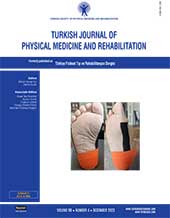Effect of yoga-based exercises on functional capacity, dyspnea, quality of life, depression, anxiety, and sleep of infected healthcare workers during the COVID-19 pandemic: A prospective clinical trial
2 Department of Physical Medicine and Rehabilitation, Health Sciences University, Gülhane Faculty of Medicine, Ankara, Türkiye
3 Ankara Bilkent City Hospital, Hospital of Physical Medicine and Rehabilitation, Laboratory of Sports Science and Rehabilitation, Ankara, Türkiye
4 Department of Sports Medicine, Ankara Bilkent City Hospital, Hospital of Physical Medicine and Rehabilitation, Ankara, Türkiye DOI : 10.5606/tftrd.2023.11605 Objectives: The study aimed to investigate the effect of yoga-based exercises on functional capacity, dyspnea, quality of life, depression, anxiety, and sleep quality following coronavirus disease 2019 (COVID-19).
Patients and methods: Forty-one COVID-19-infected healthcare professionals (35 females, 6 males; mean age: 39.7±6.5 years; range, 28 to 55 years) who were actively working during the subacute period were included in the prospective controlled study between March 2021 and September 2021. The participants were divided into two groups: the yoga-based exercise group (YBEG; n=26) and the nonintervention group (n=15). Besides routine recommendations, the YBEG performed stretching, relaxation, isometric strengthening, breathing, and meditation exercises of 60 min twice a week for eight weeks. Clinical outcome was measured with flexibility tests (shoulder flexibility and sit and reach tests), hand grip strength, 6-min walk test, dyspnea score, Beck Depression and Anxiety Inventory, Short Form 36 (SF-36) quality of life, Pittsburgh sleep quality index (PSQI), and the International Physical Activity Questionnaire (IPAQ) before and after eight weeks in both groups.
Results: Beck anxiety scores, IPAQ scores, PSQI, SF-36 pain, and social functioning subparameters were positively statistically significant in the YBEG (p<0.05). The only parameter found to be insignificant in time and between groups was the SF-36 mental health subparameter (p>0.05). In addition, the YBEG had significant improvements in muscle strength, flexibility, functional capacity, physical activity level, quality of life, anxiety, depression levels, and sleep scores between before and after the eight-week intervention period (p<0.05).
Conclusion: Yoga programs have led to an increase in functional capacity and physical performance, a decrease in anxiety and depression complaints, and an increase in the quality of life in healthcare professionals who were in the process of returning to work during the post-COVID-19.
Keywords : COVID-19, healthcare workers, yoga
















